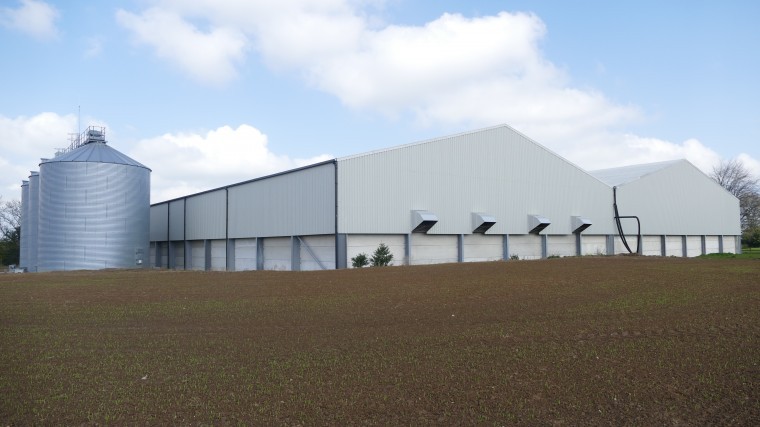After a grain dryer caught alight in 2015, causing structural damage to the farm’s existing grain store, Roger Bayly, owner of St John’s Farm in Swingfield, near Dover, Kent, was faced with a decision.
While the insurance would cover a like-for-like replacement, the fire opened up an opportunity to upgrade the site and expand the 1,800-acre arable enterprise’s on-farm storage capabilities.
Following in his forward-thinking father’s footsteps, who had installed a colossal ground-breaking 1,500-tonnes of storage in the early 1960s, Roger appointed G J Elgar Construction and work began on an extensive four-year project which would see total grain storage capacity increase from 4,000-tonnes to 13,000-tonnes.
5,000 tonne grain store
In 2016, the Ashford-based family-run construction company, headed up by founder Graham Elgar, started on the first 5,000-tonne capacity grain store. The standard steel-frame store benefits from 8-metre high eaves, making it possible to tip an articulated lorry, and also houses the 48-tonnes-per-hour dryer, which has been partially embedded into the concrete floor.
“We have looked after the whole project from conception to completion,” said Graham Elgar. “We put in planning for the additional buildings, demolished and removed the old grain stores, selected the best, most suitable steel frame for the project, completed the groundworks, erected the building and fitted the concrete panels, and worked alongside GrainTek to install the new dryer.”
Shortly after building number one was completed, G J Elgar installed a weighbridge, allowing Roger and farm manager Luke Hawkes to accurately record grain movements. St John’s Farm also invested in a Caterpillar 924H loading shovel which would enable them to handle large quantities of grain as efficiently as possible.
Additional income opportunities
With the new building, dryer, weighbridge and machinery already in place, it became clear that a second grain store could easily fit into the farm’s current set up, without the need for any additional resources, and would also allow Roger to offer modern grain storage facilities to others in the area.
“Shortly after the first barn was completed, we could see the potential to offer storage space to other growers and grain marketing firms,” said Roger Bayly. “As well as upgrading a 1960s site to modern day, it has also presented an additional source of income, a diversification if you like, without us having to go outside of our comfort zone. Grain storage is something we know and understand. It is all about future proofing the farming business.”
In 2017, St John’s Farm started taking in grain, mostly Group 1 and Group 3 wheats, from others and in 2018 work started on the second 5,000-tonne store, which is connected to the first building and benefits from a central concrete partition.
Constructing a working partnership
Having come from a farming background, Graham Elgar, who was farm manager for a large vegetable grower before starting his own business 31 years ago, has a sound knowledge of agriculture, the pressures it brings, and the different approach which is needed when it comes to construction.
“Not only does the build need to be stronger and tougher, but it needs to come in at the right price and also you have to be able to work around the farm,” said Graham, who along with his wife, Cynthia, son, Simon, and daughter-in-law, Louise, now employs a team of 20 to look after everything from demolition, to site clearance, refurbishment of buildings, installation of new builds and groundworks.
The project at St John’s Farm has been a true working partnership and throughout there has been as little disruption to normal operations as possible.
“We worked very closely with Roger and Luke on several aspects of the project,” said Graham. “When the first barn was constructed, there was already a small concrete grain store in situ on the site. The grain was scheduled to go out at any time and at one point we thought we were going to have to build the other barn over the top, before knocking the existing one down. We also had to allow access through to the original building at all times so that lorry movements could continue uninterrupted. There was a lot of coordination to make sure it worked effectively.”
“Graham takes a real interest in what is going on, and we know that his heart is in agriculture,” said Luke Hawkes, farm manager. “If I knew we were expecting a delivery, or collection, with multiple lorry movements I would sit down with Graham to talk it through; we always managed to make it work.”
Rousing refurbishments
Alongside the grain stores, G J Elgar also refurbished one of the farm’s original buildings which had been constructed in the mid-1950s and housed a dozen, now obsolete, 20-tonne concrete silos that had been installed by Roger’s father in the early 1960s. As well as re-sheeting the entire roof, Graham’s team installed a larger doorway transforming the building into a useful machinery store which is big enough for the farm’s combine harvester.
The final stages of the Bayly project are set to include upgrading the yard and entrance to ensure that it can stand up to the increased number of lorry movements expected and there have also been discussions about the option to retrospectively fit a concrete partition into the first 5,000-tonne store.
Moving on from St John’s Farm, Graham and Simon Elgar are currently undertaking several large refurbishment projects across Kent and Sussex, including the conversion of redundant agricultural buildings into rentable light industrial buildings, the demolition of outdated cold stores for a large fruit grower in north Kent, and the extension of a cold store for another fruit grower near Canterbury.




